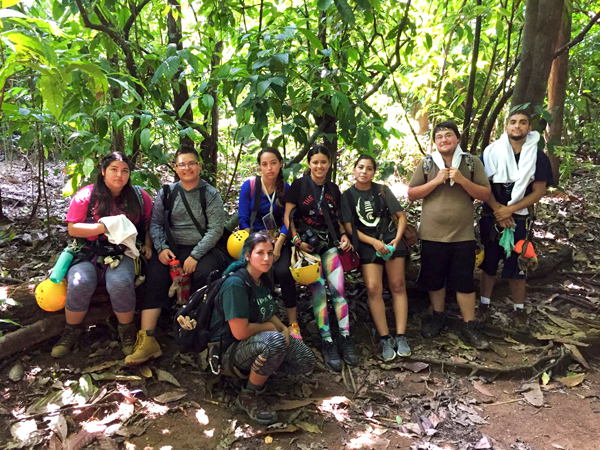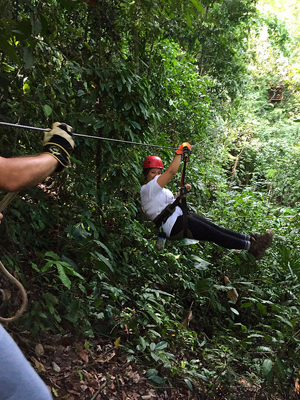- La Feria Community Holds Succesful Business Mixer Event
- Little Nashville to Take Place in Downtown Mercedes
- Lions Basketball Captures District Gold
- La Feria ISD Students Compete in Regional Chess Tournament
- Lions End First Half of 32-4A on a High Note
- La Feria ISD Held Another Successful Parent Conference
- Strong Appearance for Lions at Hidalgo Power Meet
- LFECHS Students Get to Meet Local Actress
- Students Participate in Marine Biology Camp
- Two LFECHS Students Qualify for All-State Band
UTRGV Study Abroad: Leaving Laptops Behind, UTRGV Students Embrace Costa Rica’s Natural World
- Updated: July 14, 2017

UTRGV students who participated this summer in a two-week study abroad trip to Costa Rica are seen here after a day of tree climbing. They are, from left, Victoria Mendez, Guadalupe Puentes, Jennifer Millan, Kimberly Latigo, Arlette Segoviano, David Mata, George Longoria. Front: Alejandra Torres. (Not pictured: John Rodriguez.) The course was English composition, “Living, Reading, Writing Nature.” The group lived at the Hacienda Barú Wildlife Refuge and Lodge, 830 acres reclaimed from a cattle ranch and now dedicated to local conservation and education. Courtesy Photo
by Cheryl Taylor
RIO GRANDE VALLEY, TEXAS – Nine adventurous students from The University of Texas Rio Grande Valley had the unique opportunity to witness first hand Costa Rica’s abundant and diverse wildlife, during a two-week study abroad course.
“Living, Reading, Writing Nature,” now in its seventh year, is a popular class conducted by Pamela Herring, lecturer in the Department of Writing and Language Studies.
“We stay at the enchanting Hacienda Barú, an 830-acre wildlife refuge and lodge on the central Pacific coast. It’s a three-hour drive from the hustle and bustle of San José,” Herring said.
Mechanical engineering major Kimberly Latigo, from Brownsville, said the impression of her time in Costa Rica will be long-lasting.
“My appreciation for the environment grew as I learned more and more about the path Costa Rica is taking to preserve its ecosystems,” Latigo said. “I learned about the methods implemented to lessen the impact on wildlife when a highway was built across the country in 2010. One day, I could be building roads and highways, and this trip has given me an environmental awareness that I will carry forward in my engineering studies.”
Herring’s assigned readings for the class include two books written by Jack Ewing, one of the two founders of the Hacienda Barú National Wildlife Refuge. Ewing’s first book, “Monkeys Are Made of Chocolate: Exotic and Unseen Costa Rica,” was published in 2005. In 2015, he followed up with “Where Tapirs and Jaguars Once Roamed: Ever-Evolving Costa Rica,” which Herring edited.
“This year, we had the magical experience of seeing the elusive and endangered Baird’s Tapir in the Corcovado National Wildlife Refuge – a wonderful and rare experience for those who hike the rainforest,” Herring said.
A third book for the class is “Gift from the Sea” by Anne Morrow Lindbergh, published in 1955. Herring’s writing assignments included responding to the books, journal writing, and essays about the experience of being so close to nature.
Arlette Segoviano, a Brownsville native studying landscape architecture at Michigan State University, took her mother’s suggestion that she enroll in a UTRGV study abroad course while home over the summer break. Segoviano’s mother and brother are UTRGV students, and her mother has participated in study abroad in Paris.
Segoviano said reading Ewing’s books before taking the trip to Costa Rica was a history lesson on the remarkable transformation of Hacienda Barú from a cattle ranch into a wildlife sanctuary.
“I found “Gift from the Sea” to be a positive influence, a spiritual journey, filled with meditations helpful to the group to keep an open mind and to grow in a personal way,” Segoviano said. “There was so much positive energy at Hacienda Barú, both in the preserves we visited, from the people we met, and among our group – which made it impossible to write what paradise felt like, but we tried.”
All writing was done in longhand, because Herring does not permit laptops on the trip.
“We would get together in each other’s cabins to talk about ways to express ourselves in our writing, and then to analyze what we’d done and give our personal feedback,” Segoviano said.
Latigo felt the cabin visits were great bonding moments.
“Aside from sharing our writing, we would play card games and talk,” she said. “Everyone was surprisingly honest about themselves. We shared our problems with one another. I’m surprised we were all able to bond so well, despite not knowing one another until we all met for the first time while waiting in Houston for the plane to San José.”
Days at Hacienda Barú begin with the chirping of an assortment of birds. After a healthy breakfast, the students had full days of activities that included mangrove birding and nature hiking with an Hacienda Barú guide; meditating, writing and sketching in the butterfly garden; attempting a 150-foot rope tree climb; zip-lining through the canopy; spending a night in the jungle in special shelters; and participating in Ewing’s latest activity, the Monkey Challenge, a small version of an Army obstacle course, all high in the trees.
Activities off the sprawling acreage of Hacienda Barú included a boat trip on the Sierpe River that transported the students to a birding and nature tour of Corcovado Wildlife Refuge, known for biodiversity second only to the Amazon; visits to the Alturas Wildlife Sanctuary and the Rancho La Merced Wildlife Refuge; and swimming at Marina Ballena, called the whale’s tale beach.
Latigo and Segoviano rated their favorite excursion to be swimming in a waterfall, accessed by crossing a river and followed by a climb.
“It wasn’t a long climb, though barefooted it might as well have been a mile, and we were all getting frustrated and began to wonder if this waterfall was worth it,” Latigo said. “But as soon as the waterfall came into view, my mind went blank with amazement and all I felt was gratefulness for having made that climb.”
Segoviano said she enjoyed Costa Rica more than she had expected, and it had an impact on how she looks at life.
“Allowing myself to be open within the culture made it easier to appreciate the people, the food, and its unbelievable natural creations,” she said. “Costa Rica was like a vivid dream, easily making my mind at ease. It took me two weeks to understand that paradise can be right in front of my eyes, and to value it, I had to appreciate time.”
Students who participated in the Costa Rica (WLS 4340) summer study abroad were:
- Kimberly Latigo, mechanical engineering.
- George Longoria, accounting.
- David Mata, chemistry.
- Victoria Mendez, mass communication.
- Jennifer Millan, political science.
- Guadalupe Puentes, nursing.
- John Rodriguez, computer science.
- Arlette Segoviano, landscape architecture, Michigan State University.
- Alejandra Torres, biomedical sciences.
For more information about study abroad, contact International Programs and Partnerships in the Office of Global Engagement at (956) 665-3572 or ipp@utrgv.edu.



